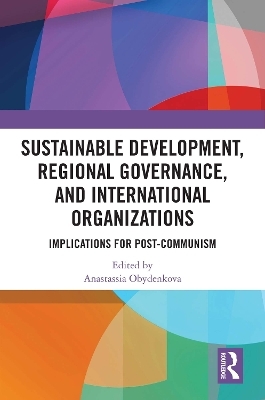
Sustainable Development, Regional Governance, and International Organizations
Routledge (Verlag)
978-1-032-74380-6 (ISBN)
This book aspires to establish a dialogue among the studies of sustainable development, global environmental politics, comparative regionalism, and area studies of Eurasia. The chapters in this book reflect deep knowledge of the authors of the main trends in environmental politics at global, international, and national levels before the invasion in Ukraine in 2022. First, the book looks into the role and impact of international organizations such as the European Union (EU), European Bank for Reconstruction and Development (EBRD), Arctic Council (AC,) and Global Forums on Climate Action on post-Communist states, but also the role of nation-states (e.g., Russia, Kazakhstan, and China). Second, the book explores relatively new international organizations, such as the Eurasian Economic Union (EAEU), the Eurasian Development Bank, and the Shanghai Cooperation Organization (SCO). How do the EAEU, EDB, and the SCO matter, if at all, in promoting an environmental agenda? How do the EU, EBRD, and the AC advance the environmental agenda across the post-Communist region? This book aspires to answer these questions and to shed more light on the challenges to sustainable development in post-Communist Europe, Central Asia, and Eurasia.
With a new foreword and afterword, this book will appeal to students, scholars and researchers of political science, international relations, area-studies as well as practitioners and policymakers working in international organizations and dealing with challenges of sustainable development. The other chapters were originally published as a special issue of Problems of Post-Communism.
Anastassia Obydenkova is a Research Scientist at the Institute for Economic Analysis at Spanish National Research Council (IAE‑CSIC), Spain, and an affiliated Professor at the Barcelona School of Economics (BSE), Spain. Her expertise is in comparative regionalism, sustainable development, geopolitics, international organizations, environmental politics, the EU Eastern Neighborhood, Eurasia, and China. She published multiple books and articles on these and other topics. She was awarded research fellowships at Yale, Harvard, and Princeton Universities. The author gratefully acknowledges financial support from grant PID2021-126209OB-I00 funded by MCIN/AEI/10.13039/501100011033 and by ERDF A way of making Europe.
Foreword: Regionalism, Environmentalism and Developmentalism in Post-Communist Eurasia Introduction—Environmental Regionalism and International Organizations: Implications for Post-Communism 1. Sustainable Development Agendas of Regional International Organizations: The European Bank of Reconstruction and Development and the Eurasian Development Bank 2. Part of the Problem? The Eurasian Economic Union and Environmental Challenges in the Former Soviet Union 3. The Nexus between Authoritarian and Environmental Regionalism: An Analysis of China’s Driving Role in the Shanghai Cooperation Organization 4. Regime, Climate, and Region in Transition: Russian Participation in the Arctic Council 5. Why Climate? The Drivers of the European Union’s Climate Governance in its Post-Soviet East European Neighbors 6. Natural Allies? External Governance and Environmental Civil Society Organizations in the EU’s Eastern Partnership 7. Post-Communist Countries’ Participation in Global Forums on Climate Action 8. Environmental Challenges and Political Regime Transition: The Role of Historical Legacies and the European Union in Eurasia 9. Whose World? Discourses of Protection for Land, Environment, and Natural Resources in Kazakhstan 10. Foreign Policy, National Interests, and Environmental Positioning: Russia’s Post Paris Climate Change Actions, Discourse, and Engagement 11. Sustainable Development and Actors of Regional Environmental Governance: Eurasia at the Crossroads Afterword
| Erscheinungsdatum | 22.08.2024 |
|---|---|
| Verlagsort | London |
| Sprache | englisch |
| Maße | 210 x 280 mm |
| Gewicht | 480 g |
| Themenwelt | Geschichte ► Teilgebiete der Geschichte ► Wirtschaftsgeschichte |
| Sozialwissenschaften ► Politik / Verwaltung ► Europäische / Internationale Politik | |
| Sozialwissenschaften ► Soziologie ► Spezielle Soziologien | |
| Wirtschaft ► Volkswirtschaftslehre | |
| ISBN-10 | 1-032-74380-8 / 1032743808 |
| ISBN-13 | 978-1-032-74380-6 / 9781032743806 |
| Zustand | Neuware |
| Haben Sie eine Frage zum Produkt? |
aus dem Bereich


